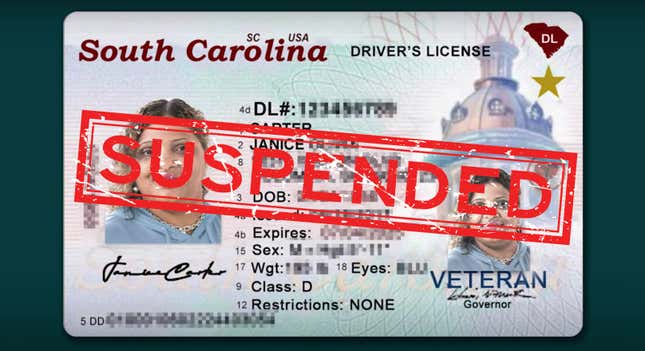
The American Civil Liberties Union has filed a federal lawsuit challenging the South Carolina Department of Motor Vehicles’ policy of automatically suspending the driver’s licenses of people unable to pay traffic tickets, a policy which disproportionately affects poor and nonwhite people.
Along with the ACLU of South Carolina, Terrell Marshall Law Group PLLC, the Southern Poverty Law Center, and the South Carolina Appleseed Legal Justice Center, the ACLU filed White v. Shwedo in the U.S. District Court for the District of South Carolina. The plaintiffs allege that the state’s wealth-based driver’s license suspensions policy violates the Fourteenth Amendment’s guarantee of due process and equal protection under the law.
When a South Carolina resident cannot pay a traffic ticket, the license holder’s driver’s license is automatically suspended without notice or a hearing. A suspension ends when a person pays all traffic fines and an additional $100 fee for reinstating their license. If a person is caught driving while suspended, they incur more fines and an additional $200 fee for each offense. In fact, the South Carolina Office of Motor Vehicle Hearings (OMVH)—the state agency with the power to review suspensions—requires a driver to pay a $200 filing fee to challenge a suspension for failing to pay a ticket.
In a state with very few public transportation options, the policy causes irreparable harm to people who lose their licenses because of the inability to pay. A suspended license can lead to unemployment, and often forces citizens to divert funds from housing, food or healthcare to pay fines and fees. According to the ACLU, black people make up 48 percent of South Carolina citizens whose licenses are suspended for failure to pay, even though African Americans only make up 27 percent of the state population.
White v. Shwedo has three plaintiffs:
- Emily Bellamy, a black mother of four whose license was suspended in 2018. Bellamy currently works at a daycare and could earn more working in home healthcare if the position didn’t require her to drive between work sites.
- Janice Carter, a black Air Force veteran who works part-time helping people involved in the legal system. She had the chance to work as a caseworker until she found out that her driver’s license was suspended during a 2018 traffic stop. She is unable to afford the reinstatement fees without a higher paying job and she can’t get a better job without a license.
- Linquista White’s driver’s license is not suspended...yet. She was reportedly forced to choose between paying her reinstatement fees for a previous suspension or losing the ability to work and transport her daughter to school. But she still has three tickets pending that are related to the financial hardship she encountered while reinstating her license.
“The South Carolina Department of Motor Vehicles is running a wealth-based driver’s license suspension system that punishes people who cannot afford traffic tickets far more harshly than those who can,” said Nusrat Jahan Choudhury, deputy director of the ACLU’s Racial Justice Program. “Taking driver’s licenses away from people who are struggling financially drives them deeper into poverty, unemployment, debt, and entanglement with the legal system. We are suing to end this counterproductive and illegal practice.”
A 2018 Bureau of Justice Statistics report and a Stanford University analysis of 200 million police traffic stops both show that police are more likely to stop black drivers than white drivers. In 2017, a Honda dealership collected data from 48 states to determine which state issued the most tickets per 10,000 citizens.
South Carolina was ranked No. 2.

